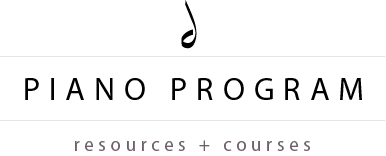Online interview with Dr. Gene Willet
I’m excited to share this interview with you! A little bit of a background – Gene and I went to graduate school together at UT-Austin (he was doing a PhD in Music Theory and I was doing a DMA in piano pedagogy), and then we both ended up teaching together for a couple of years as adjunct professors at Trinity University in San Antonio. Gene is now a music theory professor at Baldwin Wallace University. He’s a professor, dad, and all-around nice guy! He agreed to do this interview to help all of us understand the gap between private studio teachers (K-12) and university music theory study.
My purpose of the interview was to answer the question:
Are we doing enough to prepare our student for university music theory classes?
Here are some takeaways from the interview:
- If a student struggles in the first semester of Music Theory, this is an indication that he/she will struggle through many more academic music classes.
- Many of the students who drop out of the music degree program are those that struggle with the first semester of music theory.
- About 1/3rd of incoming music majors do not have enough music theory knowledge to take 1st semester music theory. These students get put into remedial music theory classes (for those universities that have them.)
- Many universities do not offer music theory classes every semester. Therefor, a remedial class can interfere with a student taking all of their courses on time.
- Many of the students who struggle with music theory are those that discovered music in their high school years.
- Often, many high schools do not offer a music theory course for students, so it is up to the individual teacher to supplement this learning.
- One skill that is lacking in a lot of students is matching pitch & singing.
- The most important remedial skills to learn are: key signatures, interval identification, knowledge of triads, and knowledge of rhythm.
I thoroughly enjoyed speaking with Gene about this, and it emphasized my thoughts about teaching music theory. We, as individual teachers, are responsiblefor our students’ progress in music theory. We need to prepare them for a situation of entering into a music degree program if they happen to pursue that in college. So private teachers – keep up the wonderful work that you are doing!
